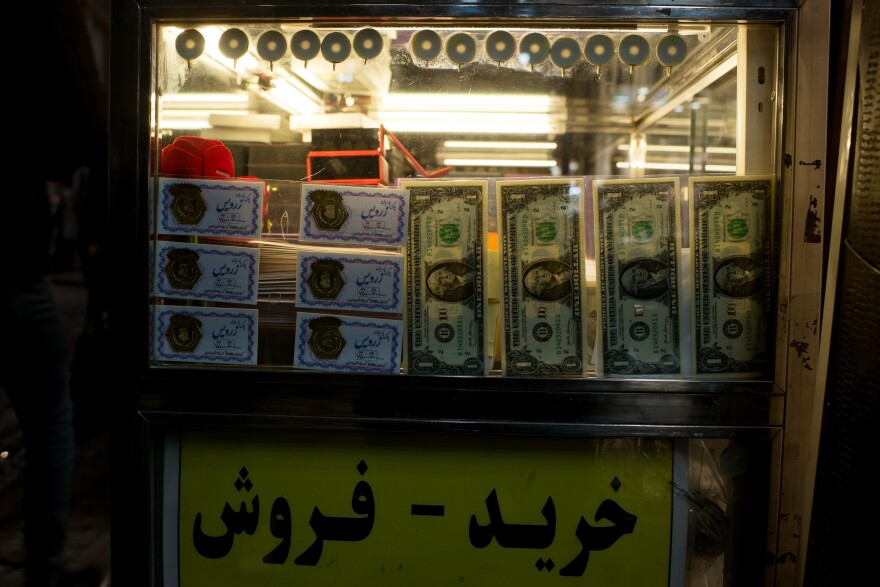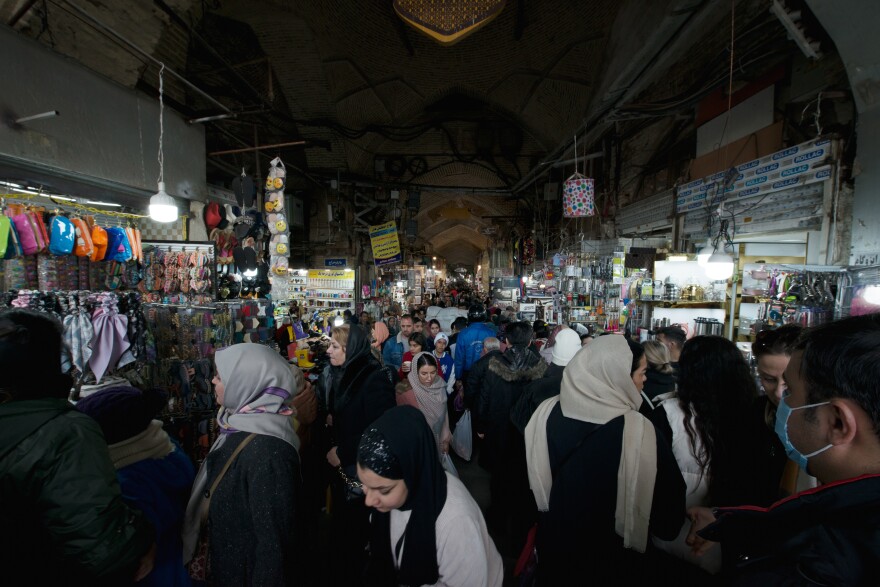TEHRAN, Iran — The shops packed side-by-side in the enormous labyrinth that is Tehran's Grand Bazaar run the gamut from spice dealers to carpet salesmen to cramped stalls hawking knockoff designer goods. Right now, they all seem to have one thing in common: prices are up.
"Nobody's happy," said a woman in her 60s. "But we're forced to get along 'cause there's nothing else we can do." On this visit to the bazaar, she was just looking around, she said. Many Iranians are struggling to stretch paychecks that don't go as far as they used to.
Then she succinctly summed up how people are feeling about daily life: "We have a nice saying in Iran. We say that the first 100 years of life are difficult. The rest will be easy."
It's been more than five months since the death of 22-year-old Mahsa Amini in police custody. She had been detained after the so-called morality police accused her of wearing improper attire, or not covering her hair.
Her death was the spark that ignited months of protests. But part of what fueled them was a sense of economic desperation. In conversations with Iranians on the street this month, nearly everyone NPR spoke with mentioned the moribund economy – even fervent supporters of the country's theocratic regime.

The Iranian government responded fiercely to the protests, killing hundreds of people and imprisoning thousands more, according to human rights groups. The crackdown has successfully scared many protesters off the streets. But Iran's economic troubles continue to feed a simmering discontent. Because of the risks associated with speaking critically about the government, many of those interviewed spoke on the condition that they not be identified by name.
Low rial means high prices
Inflation is a major source of economic pain in Iran. You can see it at the illegal currency exchange in front of the bazaar. U.S. dollars are in demand, and the government puts strict limits on how much foreign currency Iranians can legally buy, so many turn to the black market instead. On a visit earlier this month, the Iranian rial was trading at 445,000 to the dollar. At the time it was near a record low. It has since fallen even further.

Prices for just about everything in Iran have surged. "I only have money for a cup of coffee," said a 27-year-old convenience store worker. "I don't have money for the things that I need."
A car? A house? Starting a family? He said it all felt out of reach. "It's just a dream for us that is not going to happen. I can only dream it, but I can't afford it."

Saeed Laylaz, an economist who has advised a number of Iranian presidents including Hassan Rouhani, a relative moderate who left office in 2021, said Iran has never seen inflation like it is experiencing now. "Especially poor people really are under huge pressure," he said. He estimated that 20-25% of Iranians are living at or below the poverty line.
The abysmal exchange rate also hurts industries that rely on imports. "It's really bad," said a carpet salesman in Isfahan, when asked about business.
"The materials are foreign. The silk is from China. The merino wool is from Australia," he said. All of it is more expensive for him, thanks to a weakened rial.

Then there are the sanctions. When the U.S. withdrew from the Iran nuclear agreement in 2018, it reimposed tough sanctions, including a ban on importing carpets from Iran. A dealer in Tehran said that 70% of his carpets used to be sold to customers outside Iran. Now, it's more like 10% — mostly Chinese or Russians, who are not bound by U.S. or European sanctions.
Sanctions vs. mismanagement
Iranians differed on who they blamed for their economic plight.
The convenience store clerk was unequivocal: "The regime. If I want to be clear, the regime."
Others held the U.S. responsible. "We're under the boots of America," said a 75-year-old man selling old camera parts on a sidewalk in Tehran. "These awful sanctions are making life hard for everyone."
Asked what he'd like to see the U.S. do, he responded: "America hasn't really done anything for us — ever, ever. So, if we want to do something, we have to do something for ourselves."
Laylaz, the economist, said that although the Iranian regime likes to use the U.S. as a scapegoat, "All pain which you see in our streets comes directly from mismanagement."
"Looters are governing this economy and this country," he said.

He said that Iran's runaway inflation is caused by how much money the government prints to fund its spending, and by corruption at state-owned banks. And he said investors are afraid to do business in Iran because the government has a history of seizing companies.
U.S. sanctions are taking a measurable bite in one area: oil exports. According to some estimates, the extensive web of restrictions that snapped back into place when the Trump White House abandoned the nuclear deal in 2018 has cut Iran's oil revenues by half.
Laylaz said that in the past, the government papered over wasteful spending and a lack of economic productivity by "injecting oil income into society."

"It doesn't work any more," he said.
Iran and world powers have been negotiating to revive the nuclear deal by lifting sanctions in return for Iran capping its nuclear development — but talks have stalled.
The relationship between the economy and unrest
Even before protests began last year, the mix of economic and political dissatisfaction in Iran was a "ticking time bomb," according to Ali Vaez, an Iran analyst with the International Crisis Group.
"If it wasn't because of Mahsa Amini's tragic death, there would have been another trigger," he said. "There's just so much pent up frustration within the Iranian society," he said.

Economic problems have been a common thread through many waves of protest in Iran over the past several years. There were demonstrations over a declining currency in 2017 and 2018. In 2019, a spike in fuel prices drove huge crowds into the streets.
Vaez said that the miserable economy — which he blames on mismanagement, corruption and sanctions — may also be why, in parts of the country, this round of protests has waned in the face of the regime's crackdown.

"People have very little cushion to be able to engage in a long-term confrontation between the state and the society," he said. Particularly since the protesters are "armed with nothing but their bravery."
Still, some of the Iranians who spoke with NPR expressed a belief that the protests may yet achieve change, even if daily life at the moment felt impossible.
The convenience store clerk in Tehran said that he hadn't lost hope: "Change like this needs time."

Marjan Yazdi is a photojournalist based in Yazd, Iran. You can see more of her work on her website marjanyazdi.com or on instagram @marjankyazdi.
Photos edited by Ben de la Cruz/NPR.
Copyright 2023 NPR. To see more, visit https://www.npr.org.





